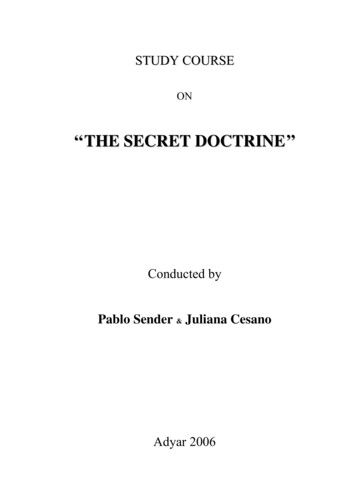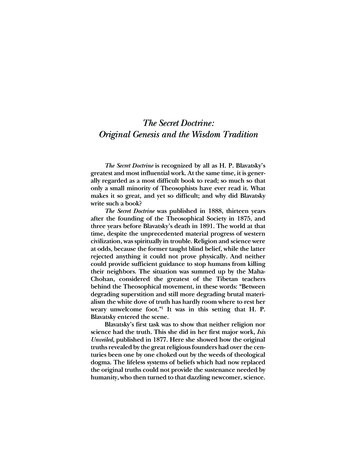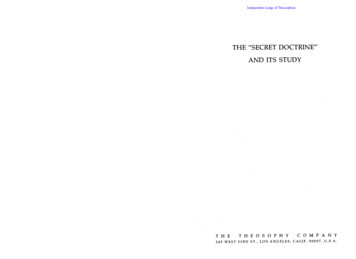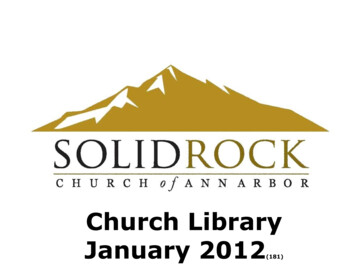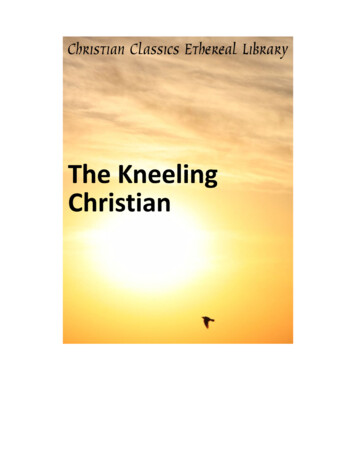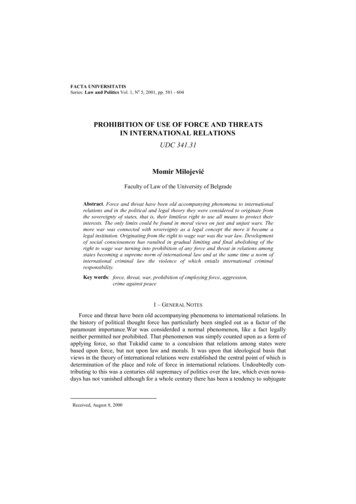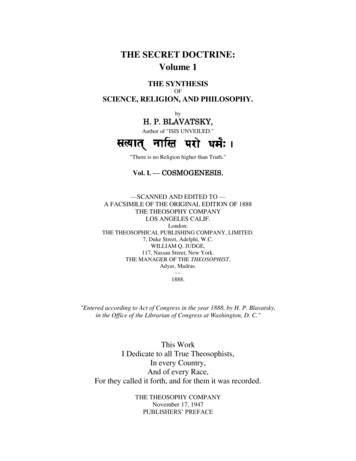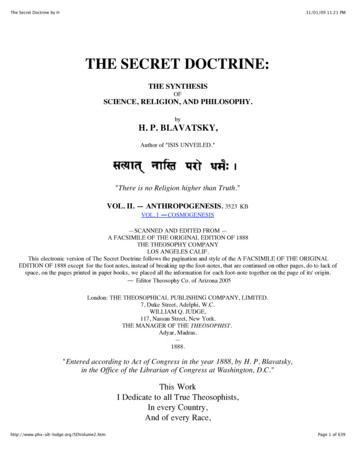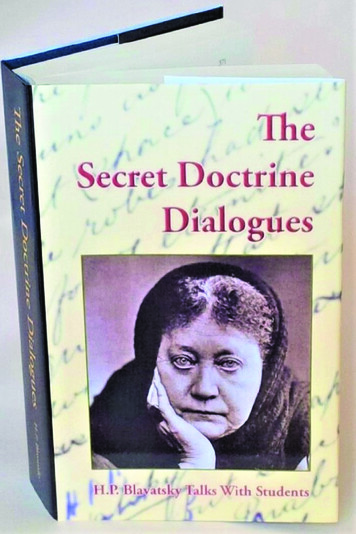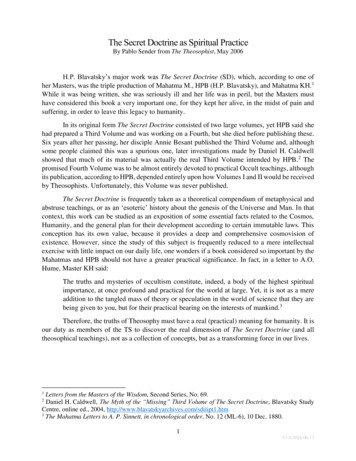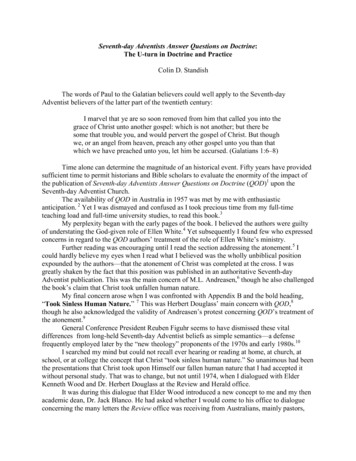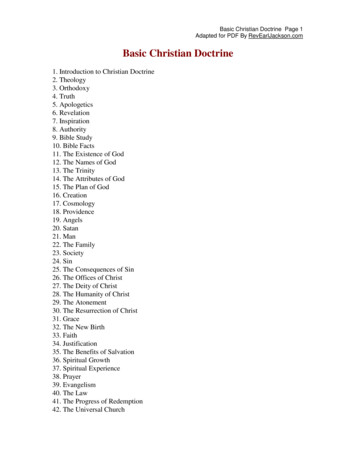
Transcription
Basic Christian Doctrine Page 1Adapted for PDF By RevEarlJackson.comBasic Christian Doctrine1. Introduction to Christian Doctrine2. Theology3. Orthodoxy4. Truth5. Apologetics6. Revelation7. Inspiration8. Authority9. Bible Study10. Bible Facts11. The Existence of God12. The Names of God13. The Trinity14. The Attributes of God15. The Plan of God16. Creation17. Cosmology18. Providence19. Angels20. Satan21. Man22. The Family23. Society24. Sin25. The Consequences of Sin26. The Offices of Christ27. The Deity of Christ28. The Humanity of Christ29. The Atonement30. The Resurrection of Christ31. Grace32. The New Birth33. Faith34. Justification35. The Benefits of Salvation36. Spiritual Growth37. Spiritual Experience38. Prayer39. Evangelism40. The Law41. The Progress of Redemption42. The Universal Church
Basic Christian Doctrine Page 2Adapted for PDF By RevEarlJackson.com43. The Local Church45. The Sacraments46. Death47. Future Events48. The Second Coming49. Hell50. Heaven
Basic Christian Doctrine Page 3Adapted for PDF By RevEarlJackson.comIntroduction to Christian DoctrineBasic Christian Doctrine 11. Doctrine is Important.This is the first of 50 studies on Basic Christian Doctrine. Each study will include 10summary statements, explanations of the terms and topics covered, and the mainScripture verses to study. The Bible is our textbook, and it places a high value ondoctrine. For example, God often says, “I want you to know” (I Cor. 11:3; Col. 2:1). Godgave us the Bible so that we might know certain important things (I John 5:13). Sadly, toomany Christians know very little about the Bible and Christian doctrine. They often knowmore about sports than about God’s Word. This series will study the basics for beginners,but also give teaching for those who are more advanced. It will cover Christian doctrinefrom the Bible, not the theories of philosophy, psychology, opinions, or false religions.2. “Doctrine” Means Teaching.In the Greek New Testament, there are 2 words for doctrine: DIDACHE andDIDASKALIA. Both mean teaching, instruction, education, and explanation. Pro. 4:1-2equates doctrine with “instruction and understanding”. A doctrine is a statement about aspecific truth. It is a statement, not a command or a question. “Doctrinal” means “havingto do with doctrine”. Jesus taught doctrine (Matt. 7:28, 22:33; Mk. 1:22, 4:2, 11:18,12:38; Luke 4:32, etc.). One of the main characteristics of early New TestamentChristians was that they followed “the Apostles’ doctrine” (Acts 2:42).3. Doctrine Must Be True and Sound.God says, “I give you good doctrine” (Pro. 4:2). Acts 13:12 calls it “the doctrine of theLord.” True doctrine must come from God, not from mere men. Even the Lord Jesus said,“My doctrine if not Mine, but His who sent Me” (John 7:16). Paul placed a very highvalue on doctrine which is true and must be sound (I Tim. 1:3, 10, 4:6, 13, 16, 5:17, 6:1,3; 2 Tim. 1:3, 3:10, 16, 4:2-3; Titus 1:9, 2:1, 7, 10). 2 John 9-10 says that we are to ignoreany so-called Christian who believes or teaches anything other than “the doctrine ofChrist” (the doctrine from and about Christ).4. Sound Doctrine is an Anchor Against the Danger of False Doctrine.You can’t fight something with nothing. We need true doctrine to fight and be defendedagainst false doctrine. False doctrine is not only useless; it is dangerous. Eph. 4:14 warnsus against the winds if false doctrine. Heb. 13:9, “Do not be carried about with variousand strange doctrines.” Jesus warned of “the doctrine of Balaam” and “the doctrine of theNicolaitans” (Rev. 2:14-14. Cf. vs. 24), “the doctrines of men” (Matt. 15:9; Mk. 7:7; Col.2:22) and “the doctrines of demons” (I Tim. 4:1). Truth sets us free (John 8:32). Godurges us to note those who cause divisions contrary to “the doctrine which you learned”(Rom. 16:17).5. There is No Substitute for the Good Knowledge of Bible Doctrine.God desires to feed us to His Word, and we become spiritually malnourished when we donot graze in the pastures of His Word. We become imbalanced, anemic, confused, easilyled astray, prone to doubt and backsliding. Some Christians do not recognize the hungerpangs they are suffering because they are not studying the Bible. Doctrine alone does notproduce spiritual maturity, but there is no maturity without it. It is erroneous to say “I justwant Christ, not doctrine.” Christology is the doctrine of Christ. Nor is it true that
Basic Christian Doctrine Page 4Adapted for PDF By RevEarlJackson.com“Doctrine divides”. False doctrine divides; truth unites.6. A Disciple is a Student.The New Testament regularly uses the word MATHETES to describe the followers ofJesus. The word means “disciple, student, learner.” To be a good student, one must beteachable. He must admit that he does not know certain things (cf. I Cor. 8:2). This is aschool from which nobody ever finally graduates, for there is always so much more tolearn. God then wants us to learn enough so that we can teach others, who in turn willteach others (2 Tim. 2:2). We are to be able to teach out children, new converts, andanswer the objections of unbelievers. But some Christians have not learned enough to beteachers, though they have been saved more than long enough. They need to be studentsagain (Heb. 5:12). A student should strive to become a teacher.7. All Christians Should Know What They Believe.A new Christian naturally hungers to be taught, like a new baby hungers and thirsts formilk (I Pet. 2:2). Too many Christians outgrow this and think they know enough. AllChristians should know Bible doctrine, not just the preachers and theologians. Ignoranceis no virtue. God often says, “I do not want you to be ignorant” (Rom. 1:13, 11:25; I Cor.1:8; I Thess. 4:14. Cf. 2 Pet. 3:8). Willful ignorance is sin (2 Pet. 3:5). There are noacceptable excuses, such as “I’m too busy, I’m not a great intellectual, It’s not thatimportant, etc.” Every Christian can and should have a strategic grasp of the Bible andbasic Christian doctrine.8. God Gave Us Minds and Expects Us to Use Them.A mind is a terrible thing to waste. God created us with minds as well as bodies, andcommands us to use both to His glory (cf. Rom. 12:1-2). The first and greatest of allGod’s commandments is: “You shall love the Lord your God with all your heart and withall your soul and with all your mind” (Matt. 22:37). It is ingratitude, laziness andselfishness to use our minds in such a way that we neglect learning what God really wantsus to know. He also gives Christians “the mind of Christ”, the indwelling Holy Spirit sothat we can spiritually learn (I Cor. 2:16. Cf. Eph. 1:18). It is dangerous mysticism thattells us to turn our minds off and go by our feelings (cf. I Cor. 14:15).9. God Gave Us Teachers to Teach Us the Bible.Jesus Himself was a teacher, a rabbi, a theologian. God has given many lesser teachers asgifts to His Church, to teach and instruct them (e.g., Eph. 4:11). The word for teachers isDIDASKALOS, related to the word for doctrine. A teacher teaches doctrine; he is adoctor of doctrine. We are to learn from those teachers which God has given to us, andignore “false teachers” who teach contrary to the Bible (2 Pet. 2:1). The teachers are notas important as what they teach. God gave us a Book of words to learn and teach, not abook of pictures to look at. Teachers are to teach Bible.10. Doctrine Must Precede Practice.Both are important, but must be in the proper order. They also must not be separated.Doctrine without practice is dry, stale and useless, producing only pride. Practice withouta valid doctrinal foundation can be legalistic or mystical. The more we know, the betterwe can live to God. The indicative statements precede the imperative commands. Wemust be willing to learn and obey (John 7:17). And the more good Bible doctrine weknow, the more our faith grows and the better we can love and worship our God.RECOMMENDED READING: R.C. Sproul, Essential Truths of the Christian Faith; J.I.
Basic Christian Doctrine Page 5Adapted for PDF By RevEarlJackson.comPacker, Concise Theology; Louis Berkhof, Systematic Theology; James MontgomeryBoice, Foundations of the Christian Faith; Charles Hodge, Systematic Theology; MillardErickson, Christian Theology.
Basic Christian Doctrine Page 6Adapted for PDF By RevEarlJackson.comTheologyBasic Christian Doctrine 21. Theology is the Science of God.The word “theology” comes from two Greek words: THEOS (God) and LOGOS (word,idea, thing, study, science). Theology is the science or study of God, just as biology is thescience of life, anthropology is the science of mankind and zoology is the science ofanimals. Theology was once commonly called “divinity”, meaning the science of divinesubjects. Theology is concerned with God, His Word and His works. True theology isbased on the Word of God. Theology, then, is simply serious Bible study.2. Biblical Theology is the Theology of Individual Parts of the Bible.The term “Biblical Theology” refers specifically to the study of the individual books andauthors of the Bible. It is based on Exegetical Theology – the study of individual wordsand sentences. Each book has a distinctive contribution to the Bible, and can usually besummed up in single sentences (e.g., Mark 1:1, John 20:31, Romans 1:17). Even the fourGospels, which overlap in much of what they say, have distinctive emphases (Jesus asKing of the Jews, Messiah, Son of Man, and Son of God). All these are links in the greatBible chain. All complement each other; there are no contradictions. Biblical Theology isalso concerned with the chronological progression and development of God’s revelationand work in history, culminating in Jesus Christ (Heb. 1:1-2).3. Systematic Theology is the Organization of Bible Doctrines into Categories.Systematic Theology deals with the Bible as a complete entity. Just as a deck of cards canbe dealt out numerically, it can also be categorized by suits. The “whole counsel of God”(Acts 20:27) concerns the entire message of the Bible, and is more concerned with God asthe one author than with the individual human authors. Serious study of Scripture showsthat certain topics are repeated and developed, For example, Jesus engaged in systematictheology in Luke 24:27 when He took His apostles through the Bible on the theme of theMessiah and His work. The Bible contains a system of truth, sometimes called “that formof doctrine” (Rom. 6:17) or “the pattern of sound words” (2 Tim. 1:13). This explains theharmony of all the parts, and shows the many inter-relationships of individual doctrines.God is a God of order (I Cor. 14:33, 40). Among the categories are Christology (scienceof Christ), Soteriology (salvation), etc.4. Historical Theology is the Development of Theology in Church History.Just as Biblical Theology deals with the progression of revelation in history, so HistoricalTheology deals with the progression of the study of revelation among Christians. But thetwo are not equal in importance. Church history deals with Christians, events, dates,places, churches, etc. Historical theology deals with the theological controversies,theologians, books, councils, etc. Few heresies are really new. Truth and error have beendebated repeatedly on a host of fronts. Certain truths were discussed and challenged atspecific times in particular: the one true God (up to AD 200), person of Christ and Trinity(300-400), justification by faith (1500-1600), etc. Similarly, each Christian engages in hisown personal historical theology as he grows in the study of the Bible.5. Practical Theology is the Application of Theology to Christian Living.This form of theology shows the relationship between Biblical principles to personalpractices. It explains the underlying reasons behind Biblical commands and examples.
Basic Christian Doctrine Page 7Adapted for PDF By RevEarlJackson.comThus there is a theology of evangelism, prayer, church life, and many others. It is alsocalled Theology of Spirituality.6. Tradition Is Oral Teaching.Tradition can be good or bad. The word PARADOSIS is used in a good sense in 2 Thess.2:15, 3:6 and possibly 1 Peter 1:18. The prophets and apostles and even our Lord Jesusspoke many things not written down in Scripture (cf. John 20:31, 21:25). But we have noauthoritative record of that. The Jews had the idea that Moses passed on divine revelationorally to the elders, who in turn passed it on down orally to others down to the time ofJesus. But Christ rebuked their placing tradition on the same level as Scripture (Matt. 15).This Jewish tradition was later written down as the Mishnah. The Catholic Churchrepeated the same mistake. Oral tradition may be useful for a short time, but it easilybecomes rumor, opinions and “the traditions of men” in contrast to the commandments ofGod (Col. 2:8, 22). Tradition, therefore, is not a solid foundation for theology. Only theBible is.7. Religion is the Practical Theology of Worship.Again, the word “religion: can be good or bad. James 1:26-27 gives both. The good senseis that Christianity is the true religion in that it alone provides the true way ofworshipping God. All other religions are false. But religion, or the practical exercise ofworship, must be based on theology and not the other way around. Christianity is morethan rituals and ceremonies. Moreover, the elaborate Old Testament worship ceremonieswere replaced with two simple ceremonies (baptism and Communion), and now theemphasis is more spiritual. True religion is neither magic nor superstition, but theworship of God in Spirit and in truth (John 4:24).8. True Theological Method is Important.Both the content and method of theology are important. There is a right way to “dotheology” and many wrong ways (such as basing it on tradition, religion, philosophy, etc).True theology must be based on the Bible alone. And that is the basic principle oftheological method. True theology presupposes the total truth of the Bible. Theology isreceived by revelation of God, not conceived by the mind of Man (Col. 2:8). God is thesubject, not the object, of theology. That is, He Himself teaches us about Himself. Thusthere are both similarities and differences between theological and natural science.Another important principle is seeing how the NT uses the OT. The Bible itself useslogic, but logic itself must be subject to the Word of God, else it becomes merephilosophy.9. Some Theological Truths are Explicitly Stated in Scripture.The most important truths are explicitly stated, such as “God is love”, “God is light, “Inthe beginning God created the heavens and the earth”, “The Lord thy God is one Lord”,etc. These may be stated in only 2 or 3 words, or longer sentences. Some are given onlyonce; others, many times. They are universal and absolute, undeniable and irrefutable (ITim. 3:16). They are plainly stated, yet infinitely profound. They are like axioms, maximsand formulas.10. Other Theological Truths are Logically Derived from Scripture.By comparing spiritual things with other spiritual things (I Cor. 2:13), we derive othergreat theological truths. The Trinity is not stated in any one verse of the Bible, but is theimplicit teaching of Scripture, seen when we combine verses such as Deut. 6:4 and Matt.
Basic Christian Doctrine Page 8Adapted for PDF By RevEarlJackson.com28:19. The NT sometimes draws on underlying principles of certain OT verses anddevelops a new doctrine of practice (e.g., I Tim. 5:17-18). Thus, principles of theologyare important. But we must be careful to observe the limits of this theological method,and stay close to Scripture and avoid speculation.
Basic Christian Doctrine Page 9Adapted for PDF By RevEarlJackson.comOrthodoxyBasic Christian Doctrines 31. Orthodoxy is Right Doctrine.The word "orthodoxy" comes from two Greek words meaning "right doctrine." It is notused in the NT, but the idea is the same as "sound doctrine" in I Tim. 1:10 2 Tim. 4:3, Tit.1:9, 2:1. We use it in English to refer to the right mainstream as opposed to the unusualfringe (such as orthodox medicine vs. alternative medicine). The Greek Orthodox Churchonce held to Biblical orthodoxy, but no more. The test of Christian orthodoxy is notantiquity, but Scripture. That doctrine alone is orthodox which is Biblical. In turn,orthodoxy must produce "orthopraxis", or right practice.2. Some Truths are Essential and Foundational to All Others.All Bible truths are true, but some are "of first importance" (I Cor.15: 3-4). Heb. 6:1 callsthem "the elementary teachings about Christ". They are the basics, the ABC doctrines. Intheology we call this "dogma". Dogmatic theology is concerned with the essential truthsof Christianity. Dogmatic doesn't mean stubborn or obscurantist; it means firmcommitment to truth. Christian dogma is not defined by a church (as Romanism claimsfor itself), but by the Bible alone. One must believe these essential truths to be a realChristian. It is impossible for someone who rejects, substitutes or adds to these essentialtruths to be a true Christian. These are "sine qua non", or "that without which"Christianity is not Christianity. It is dangerously wrong to say, "It doesn't matter what youbelieve as long as you are sincere."3. The Gospel is the Main Message of the Bible.Among the essential doctrines is the Gospel. EUANGELLION means "good news" or"good message". It is a divine record of facts to be believed, not a command (that is Law).Specifically, I Cor. 15:3-4 sums up the Gospel as the truth about the person and work ofChrist - the God-Man who died for our sins and rose again. There is only one true Gospel,but many false Gospels (Gal. 1:8-9). The OT preached the same Gospel in advance byprophecy (Gal. 3:8, Luke 24:25-26, 46-47). The true Gospel calls for only one responsefor salvation: faith and repentance (Mark 1:15, Acts 20:21). To add good works orbaptism to this is to preach a false Gospel. To preach the Gospel is simply to present thebasic truths about Jesus Christ.4. Evangelicalism and Fundamentalism are Two Kinds of Orthodoxy.Evangelicalism accepts the truth of the evangel (Gospel). But it does not always defend itstrongly. A weak form is known as "Neo-Evangelicalism". It emphasizes peace and unityover truth. Fundamentalism is the term given to militant Evangelicalism. This is that kindof orthodoxy which fights to defend the essentials by exposing false kinds of Christianity.A key verse is Psa. ll:3, "If the foundations are destroyed, what can the righteous do?" Weneed to believe and defend the fundamentals of the faith.5. Orthodoxy is Also Called The Faith.Another term for this basic content of Bible Christianity is "The Faith" (I Tim. 1:19, 3:13,4:1, 5:8, 6:10, 21, etc). It refers to those basic doctrines which are to be believed. Savingfaith has a content, known as The Faith. Jude 3 calls upon us not only to believe it but toearnestly defend it. "The Analogy of Faith" (cf. Rom.12:6) means that we study the Biblewith reference to this basic message. Any interpretation that contradicts the basic Gospel
Basic Christian Doctrine Page 10Adapted for PDF By RevEarlJackson.comis automatically a wrong interpretation. We need to see the harmony of the entire Bible'smessage, structured around this basic theme of orthodoxy, the Gospel, The Faith.6. Heresy is False Doctrine.Orthodoxy is true doctrine. Heterodoxy is false doctrine. The technical word here isheresy, meaning one's own views that divide from others. In practice, it produces wrongschisms. In general, all error is wrong and heretical. But in a more precise sense, heresymeans the rejection of a fundamental truth. One can still be saved if he is in error on asecondary truth but still believes the essential truths. But rejection of any or all of thebasics is heresy and theological poison. Scripture repeatedly warns against promoters ofheresy as false prophets (Matt. 7:15), false teachers (2 Pet. 2:1) and false brethren (2 Cor.11:26). God pronounces a curse on those who preach a false Gospel (Gal. 1:8-9). Heresyis no small thing. It attacks the very essentials of the faith. Those who believe heresy, donot believe in the fundamentals, and are not true Christians. It primarily refers to pseudoChristianity, not non-Christianity.7. Apostasy Occurs When a Person No Longer Professes Orthodoxy.This is not the same as backsliding. True Christians backslide; but they do not lose theirsalvation. Apostasy occurs when someone who once professed the truth of the Faith nowrejects it. This is what Heb. 6 is discussing. Judas is a good example. Apostasy is spiritualand theological treason. There are degrees of apostasy. One may reject only one essentialdoctrine but still profess the others, such as when someone goes from Evangelicalism toRoman Catholicism or Mormonism or other brands of pseudo-Christianity. Full-blownapostasy is when someone who once professed all the basic truths now rejects all of them,such as when one becomes an atheist. 2 Thess. 2:3 and I Tim. 4:1 predicted that therewould be a great apostasy one day.8. A Creed is a Short Summary of What You Believe.After the time of the NT, early believers were challenged by the Romans and otherpagans, "What do you believe?" The Christians replied by producing short summaries ofthe Faith. The word "creed" comes from the Latin word "credo", which means "I believe".A creed, then, is a short summary of the Faith, or orthodox fundamentals. Some passagesin the NT hint at the idea (I Tim. 3:16). The earliest post-Biblical creed is known as theApostles' Creed (2nd century), but was not composed by any of the Apostles. It meantthat it was a summary of the Gospel preached by the Apostles. The Nicene Creed (early4th century) amplified it a bit in order to emphasize the deity of Christ. The ApostlesCreed is popular with Protestants, the Nicene with Catholics. A third and longer earlycreed is the Athanasian Creed, based on the teachings of Athanasius in the 4th century. Itmainly deals with the Trinity. A Christian ought to be able to summarize his own creed.9. A Confession of Faith is a Longer Summary of Christian Doctrine.Later, Christians expanded their brief summaries to include other doctrines. Someconcentrate on specific truths which were debated at that time. Some are moretheological, others more practical or ecclesiastical. If a creed is concerned with theprimary doctrines of the Faith, a confession of faith expands it to include the secondaryand other doctrines. Most churches have a confession of faith. The best and most wellknown ones are the Westminster Confession of Faith, the 1689 Baptist Confession ofFaith, the Belgic Confession, and the 39 Articles. Many contain Scripture proofs.10. A Catechism is a Confession of Faith in Question-and-Answer Form.
Basic Christian Doctrine Page 11Adapted for PDF By RevEarlJackson.comCatechisms were written mainly to instruct children and new converts. They are veryuseful for memorizing. The best ones are the Westminster Shorter Catechism, theHeidelberg Catechism, Keach's Catechism (the Baptist version of the WestminsterShorter Catechism), and others. Creeds, confessions and catechisms are useful tools tostudy the Faith. But they must be tested by the Bible, for Scripture alone gives us trueorthodoxy.
Basic Christian Doctrine Page 12Adapted for PDF By RevEarlJackson.comTruthBasic Christian Doctrines 41. God is Truth.Truth is an important doctrine found throughout the Bible and is basic to the study ofother doctrines. But truth is not an impersonal concept or idea. God is the final andultimate truth. He is truth itself. He is "the God of Truth" (Psa. 31:5). He is "the true God"(Jer. 10:10). The Greek philosophers asked three main questions: What is justice, what isbeauty, and what is truth? Pilate asked, "What is truth?" Jesus Himself is the incarnationof truth, for He said "I am the truth" (John 14:6). Truth is in Jesus (Eph. 4:21). God is thesource of all truth, facts, existence, reality and law. All truth is God's truth. God is truth,speaks truth, defines truth. Someone said that God is the truth, the Bible is the truth aboutthe truth, and fundamentalism is the truth about the truth about the truth. The Bible is the"Word of truth" because it is God's Word.2. There is No Such Thing as a Brute Fact.Cornelius Van Til popularized the theological statement that there is no such thing as abrute fact. He was right. No "fact" just simply exists in and of itself. All facts are truebecause God made them so. Whatever is true finds its source in God. For example, 1 1 2. Why? Not, "Well, it just does, that's all." No. 1 1 2 because God made it likethat. God is higher than all facts. Even the laws of mathematics exist because of God.Gordon Clark meant this when he said "All the laws of science are false", meaning thatthey do not exist of themselves but because God made them so. God does not saysomething because it is true; it is true because God says so. Facts are but littleglimmerings of what God makes true.3. Truth is Not Determined by Man.Since God alone is truth, truth is not determined by Man, for Man is not God. Truth is notdetermined by human vote, opinion, observation, science or feeling. It is our job todiscover truth, not invent it. Man has personal tastes and opinions, but these are merelysubjective feelings. Humanism would make Man the measure of all truth. This is but todeify Man and de-throne God. How then does Man discover truth? By receiving it fromGod. God reveals truth through Nature partially and through Scripture definitively. .Man's part is to believe it on the basis of God's authority.4. Wisdom is Seeing Things as God Sees Them.The first step is faith. We must believe whatever God says, otherwise we are calling Goda liar (I John 5:10). To believe God is to submit our minds to Him (2 Cor. 10:5). It is torecognize that God is truth and He alone has the right perspective on His Creation. This isa truly awesome thing to do. "The fear of the Lord is the beginning of wisdom" (Psa.111:10). Because we are finite and sinful, we do not see things as they really are. Weneed God to teach us. God's Word makes us truly wise. The opposite of this wisdom iswhat the Bible calls folly - foolishness, insanity, nonsense. Sin is the very epitome offolly. It is spiritual insanity to believe one's own faulty perspective rather than God's.5. Discernment is the Ability to Distinguish Between Truth and Error.One key aspect of wisdom is discernment. It is the ability to tell truth from error, goodfrom evil (Heb. 5:14). Adam and Eve lacked it when they believed Satan and themselvesrather than God. We need God's Word to be able to "distinguish things that differ".
Basic Christian Doctrine Page 13Adapted for PDF By RevEarlJackson.com6. Truth and Error are Different.Truth and error are opposites. They are irreconcilable enemies. They are as different aslight and darkness. God is truth and light; in Him is no darkness or error (I John 1:5).Among other things, this means that a statement can be true or false, but not both. Astatement cannot be true and false at the same time in the same way. We call this "TheLaw of Non-Contradiction". "A" cannot be the same as "non-A". God has made things theway they are and does not play tricks with us. It is not true to say, "The exception provesthe rule" (exceptions disprove the rule, and show that the rule was faulty), God is not aGod of contradiction. The Bible has no contradictions. It is Satan, not God, that is thefather of error and lies (John 8:44). Modern Man greatly errs when he fails to see thisdifference.7. Truth is Reality.The fundamental definition of the word "truth" is reality. A true statement is one thatcorresponds with reality. If we say, "The sentence, 'The dog is white' is true", we meanthat the dog really is white. The Greek word is ALETHEIA. The Hebrew word is EMET,which also has the implication of trustworthiness, reliability. Truth makes sense. Error isnon-sense. Truth is real. The so-called Christian Science cult denies all this by saying that"All is illusion". No, God has created things as real. It is sin that makes them illusions.We need to see things as they really are.8. Truth is Absolute, Not Relative.Modern Humanism teaches that truth is relative. Each person invents his own truth. Thisis wrong, dangerous and sinful. It simply is not true that "You make your own truth." Weare created, not creators. We cannot create reality. To say that we can is to say that we aregods, which is what the Father of Lies wants us to believe (Gen. 3). Truth is absolute, notof itself, but because it is rooted in God. God is the final absolute and He does notchange. The angels laugh and weep at the utter folly and nonsense of modern Humanism'sphilosophical error that says, "That's your truth. Mine is different." Until all this is seenfrom God's perspective, we are lost in a jungle of Man-centered, sin-dominated blindinsanity.9. Truth is Sometimes a Paradox.Truth is not contradictory to itself, but to error. Nevertheless, we are finite and do notgenerally see all the relationships between the things God has said and made. God hasrevealed some things as paradoxes. A paradox is an enigma, like "He that loses his lifeshall find it, and he that would save his life shall lose it" (Mark 8:35). An antinomy is anapparent contradiction, or two statements which are equally true but we can't resolve howboth can be true. For example, divine sovereignty and human responsibility are bothrevealed truths, but we do not grasp how they are both true. There are also mysteries, orthings partly revealed and partly hidden (cf. Deut. 29:29). The Trinity is the mystery ofmysteries. We know there is only one God and that He has three persons or aspects. Butwe cannot fathom the depths of this great mystery.10. Profundity Lies in Simplicity.One final thing about truth is important. The deepest theological truths are not thecomplicated ones, but the basic ones. A theologian once said that the most profound truth
Adapted for PDF By RevEarlJackson.com Basic Christian Doctrine 1. Introduction to Christian Doctrine 2. Theology 3. Orthodoxy 4. Truth 5. Apologetics 6. Revelation 7. Inspiration 8. Authority 9. Bible Study 10. Bible Facts 11. The Existence of God 12. The Names of God 13. The Trinity 14. The
